Related Research Articles
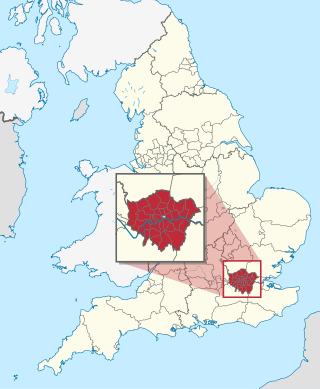
The London boroughs are the 32 local authority districts that together with the City of London make up the administrative area of Greater London; each is governed by a London borough council. The present London boroughs were all created at the same time as Greater London on 1 April 1965 by the London Government Act 1963 and are a type of local government district. Twelve were designated as Inner London boroughs and twenty as Outer London boroughs. The City of London, the historic centre, is a separate ceremonial county and sui generis local government district that functions quite differently from a London borough. However, the two counties together comprise the administrative area of Greater London as well as the London Region, all of which is also governed by the Greater London Authority.

The Royal Borough of Kensington and Chelsea is an Inner London borough with royal status. It is the smallest borough in London and the second smallest district in England; it is one of the most densely populated administrative regions in the United Kingdom. It includes affluent areas such as Notting Hill, Kensington, South Kensington, Chelsea, and Knightsbridge.

The Metropolitan Borough of Chelsea was a metropolitan borough of the County of London between 1900 and 1965. It was created by the London Government Act 1899 from most of the ancient parish of Chelsea. It was amalgamated in 1965 under the London Government Act 1963, with the Royal Borough of Kensington to form the Royal Borough of Kensington and Chelsea.
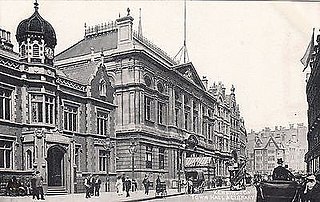
The Metropolitan Borough of Kensington was a Metropolitan borough in the County of London from 1900 to 1965, which since 1901 was known as the Royal Borough of Kensington, following the death of Queen Victoria, in accordance with her wishes.
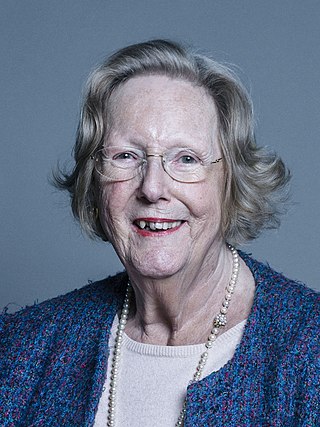
Joan Brownlow Hanham, Baroness Hanham, CBE is a former member of the House of Lords. She sat as a Conservative.

Westminster City Council is the local authority for the City of Westminster in Greater London, England. The city is divided into 20 wards, each electing three councillors. The council is currently composed of 31 Labour Party members and 23 Conservative Party members. The council was created by the London Government Act 1963 and replaced three local authorities: Paddington Metropolitan Borough Council, St Marylebone Metropolitan Borough Council and Westminster Borough Council.

Kensington and Chelsea was a constituency represented in the House of Commons of the Parliament of the United Kingdom 1997–2010. It was one of the safest Conservative seats in the United Kingdom, and since its creation in 1997 became a prestigious seat, with MP Alan Clark, the former Defence Secretary Michael Portillo and the former Foreign Secretary Malcolm Rifkind all holding the seat for the Conservatives. The seat was abolished for the 2010 election, when the 1974–1997 Kensington constituency was recreated and Chelsea formed a new constituency together with the southern part of the former Hammersmith and Fulham constituency, called the Chelsea and Fulham constituency.

The London Government Act 1963 is an Act of the Parliament of the United Kingdom, which created Greater London and a new local government structure within it. The Act significantly reduced the number of local government districts in the area, resulting in local authorities responsible for larger areas and populations. The upper tier of local government was reformed to cover the whole of the Greater London area and with a more strategic role; and the split of functions between upper and lower tiers was recast. The Act classified the boroughs into inner and outer London groups. The City of London and its corporation were essentially unreformed by the legislation. Subsequent amendments to the Act have significantly amended the upper tier arrangements, with the Greater London Council abolished in 1986, and the Greater London Authority introduced in 2000. As of 2016, the London boroughs are more or less identical to those created in 1965, although with some enhanced powers over services such as waste management and education.

Chelsea and Fulham is a constituency represented in the House of Commons of the UK Parliament since its 2010 creation. It is currently represented by Greg Hands of the Conservative Party. He was the MP for the former neighbouring constituency of Hammersmith and Fulham from 2005 to 2010 before it was abolished. He is currently the Chairman of the Conservative Party.
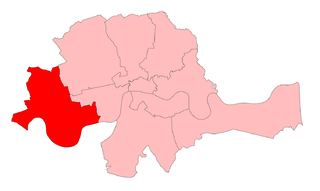
Chelsea was a borough constituency, represented in the House of Commons of the Parliament of the United Kingdom.

The 1997 Prime Minister's Resignation Honours were officially announced in two supplements to The London Gazette of 1 August 1997 and marked the May 1997 resignation of the Prime Minister, John Major.

Kensington and Chelsea London Borough Council in London, England, is elected every four years. Since the last boundary changes in 2014, 50 councillors have been elected from 18 wards.
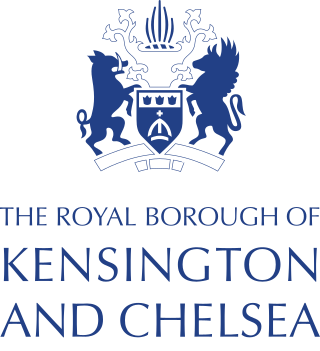
Kensington and Chelsea London Borough Council is the local authority for the Royal Borough of Kensington and Chelsea in Greater London, England. It is a London borough council, one of 32 in the United Kingdom capital of London. Kensington and Chelsea is divided into 18 wards, each electing either two or three councillors. The council was created by the London Government Act 1963 and replaced two local authorities: Kensington Metropolitan Borough Council and Chelsea Metropolitan Borough Council.
The 1998 Kensington and Chelsea Royal Borough Council election took place on 7 May 1998 to elect members of Kensington and Chelsea London Borough Council in London, England. The whole council was up for election and the Conservative Party stayed in overall control of the council.
The 1964 Kensington and Chelsea Council election took place on 7 May 1964 to elect members of Kensington and Chelsea London Borough Council in London, England. The whole council was up for election and the Conservative Party gained control of the council.

Daniel Michael Gerald Moylan, Baron Moylan is an English Conservative politician and a member of the House of Lords, holding dual British and Irish citizenship.
Emma Dent Coad is a British politician who served as Member of Parliament (MP) for Kensington from 2017 to 2019. A member of the Labour Party, she has been a Member of Kensington and Chelsea London Borough Council since 2006.

The 2018 Kensington and Chelsea London Borough Council election took place on 3 May 2018 to elect members of Kensington and Chelsea London Borough Council in England. The election was held on the same day as other local elections in England. While Kensington and Chelsea is usually regarded as a Conservative stronghold, there was media speculation that Labour could win control of the council in the wake of the Grenfell Tower fire. However the Conservatives maintained control, losing just one Councillor, in St. Helen's Ward, winning 36 seats to Labour's 13.

The old Town Hall was a municipal facility at Kensington High Street in Kensington, West London. It was demolished in 1982.

The 2022 Kensington and Chelsea London Borough Council election was held on 5 May 2022. All 50 members of Kensington and Chelsea London Borough Council were elected. The elections took place alongside local elections in the other London boroughs and elections to local authorities across the United Kingdom.
References
- ↑ "Admission Register to the Middle Temple October 1967 — December 1975" (PDF). Honourable Society of the Middle Temple. p. 15.
- ↑ "All local authorities will feel the consequences of the Grenfell fire". The Guardian. 22 June 2017.
- ↑ "Carnival clearing, not backing Boris, and Korean comparisons: politics in Kensington". New Statesman. 27 August 2014. Retrieved 5 May 2020.
- ↑ "Gregory Lauder-Frost". Steeple Times. 4 February 2015.
- ↑ Walker, David (2008). "Civic Centres". University of Warwick. Retrieved 9 September 2020.
- ↑ "Refuse Collection (Privatisation)". Hansard. 8 December 1982.
- ↑ "The evolution of London Local Government" (PDF). Royal Borough of Kensington and Chelsea. p. 23.
- ↑ Massingberd, Hugh, (editor) The Daily Telegraph Fourth Book of Obituaries - Rogues, Macmillan Publishers Ltd., London, 1998, pps: 59-61. ISBN 0-333-73999-X